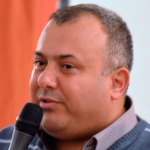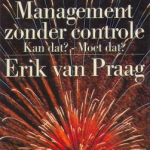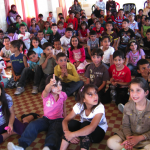Als ik dit schrijf is de uitslag van het Brexit referendum nog niet bekend. Die uitslag doet er ook niet zo veel toe – het betekent weinig in het licht van de Eeuwigheid. Maar wat wel belangrijk is, is de aard van de campagnes in Engeland, en het effect daarvan daarbuiten.
 Afgezien van de weerzinwekkende toon waarop het debat werd gevoerd, werden de campagnes gekenmerkt door doemscenario’s, zowel bij de voorstanders van blijven als bij de voorstanders van Brexit. Wat ik heb gemist is een visie, een wenkend perspectief op een toekomst die het waard is om voor te gaan. Aan de blijven-kant was het enige argument economische groei* en meer van hetzelfde neo- liberale, hardvochtige en uit de hand gelopen kapitalisme en globalisme, en aan de Brexit kant een nostalgisch terugverlangen naar het oude ‘Britannia, rule the waves’ (een lied uit 1740!), waarbij men tegelijkertijd een knus en raszuiver eigen volk zou beschermen door vreemdelingen te weren (De Engelsen hebben een lange traditie van discriminatie, tegenover Indiërs en Joden bijvoorbeeld, al liep het nooit zo uit de hand als bijvoorbeeld in Polen en Duitsland). Zou je deze weinig aantrekkelijke alternatieven met enige moeite nog als positief kunnen kenschetsen, in de campagnes lag de nadruk op de rampen die Engeland zouden treffen als de andere kamp zijn zin zou krijgen.
Afgezien van de weerzinwekkende toon waarop het debat werd gevoerd, werden de campagnes gekenmerkt door doemscenario’s, zowel bij de voorstanders van blijven als bij de voorstanders van Brexit. Wat ik heb gemist is een visie, een wenkend perspectief op een toekomst die het waard is om voor te gaan. Aan de blijven-kant was het enige argument economische groei* en meer van hetzelfde neo- liberale, hardvochtige en uit de hand gelopen kapitalisme en globalisme, en aan de Brexit kant een nostalgisch terugverlangen naar het oude ‘Britannia, rule the waves’ (een lied uit 1740!), waarbij men tegelijkertijd een knus en raszuiver eigen volk zou beschermen door vreemdelingen te weren (De Engelsen hebben een lange traditie van discriminatie, tegenover Indiërs en Joden bijvoorbeeld, al liep het nooit zo uit de hand als bijvoorbeeld in Polen en Duitsland). Zou je deze weinig aantrekkelijke alternatieven met enige moeite nog als positief kunnen kenschetsen, in de campagnes lag de nadruk op de rampen die Engeland zouden treffen als de andere kamp zijn zin zou krijgen.
Dit soort debatten zijn natuurlijk niet specifiek Engels. We hoeven maar te denken aan het debat rondom ons eigen Oekraïne referendum, het Oostenrijkse debat rond de presidentsverkiezingen en de voorverkiezingen in de VS, om soortgelijke processen waar te nemen. Het gaat ons dus allemaal aan.
Ook niet-Britten, die zich hebben uitgesproken over hun voorkeur voor de uitslag van het Britse referendum (Juncker, Rutte) deden dat zonder enige bevlogenheid en visie. Zelfs Obama miste de kans om inspirerend te zijn, terwijl dat toch zijn sterke kant is.
Er wordt veel gesproken over dat we meer moeten praten over ‘waarden’, die ons (politieke) handelen zouden moeten bepalen, maar ik geloof dat het probleem dieper zit. Onze ‘leiders’ hebben werkelijk geen idee van waar ze eigenlijk naar toe zouden willen. Hooguit willen ze (vaak halfslachtig) de uitwassen van onze huidige samenleving een beetje aanpassen, zodat de meest schrijnende consequenties worden weggenomen. En verder gaan ze gewoon voor korte termijn belangen, vaak niet eens van de hele bevolking maar van deel-groepen uit de samenleving. Dat is trouwens ook de definitie en functie van politiek: het voeren van een belangenstrijd met vreedzame middelen.
Maar zelden of nooit hoor je praten over een toekomst waarin we samen werken met landen en volken die net als wij zich in willen zetten voor een wereld waarin het waard is te leven, voor ons en ons nageslacht. Een wereld van vrede, een rechtvaardige welvaart verdeling en een leefbaar klimaat.
Maar misschien willen we dat niet, en zijn die landen er niet, onmdat we persoonlijke korte termijn belangen voor laten gaan. Zijn we bereid wezenlijke zaken op te geven om die wereld te bereiken? Zo ja, dan zullen de leiders opstaan die ons naar die wereld zullen toe leiden, anders niet. Ieder volk krijgt de leiders die het verdient.
In mijn volgende blog zal ik een eerder gepubliceerde schets van zo’n wereld opnieuw publiceren, opdat we niet vergeten wat er op het spel staat.
- Economische groei is trouwens helemaal niet meer mogelijk, zie: https://www.energiepodium.nl/nieuws/item/we-zitten-klem-maar-willen-het-niet-weten
 Zou het leiderschap dat we nodig hebben uit Europa of zelfs Nederland kunnen komen?
Zou het leiderschap dat we nodig hebben uit Europa of zelfs Nederland kunnen komen?
 An utopia? Or a feasible vision, an alternative to the collapse of the present feverish world? Maybe the world that we’ve painted is not your ideal world, but there’s nothing to stop you from dreaming your own dream.
An utopia? Or a feasible vision, an alternative to the collapse of the present feverish world? Maybe the world that we’ve painted is not your ideal world, but there’s nothing to stop you from dreaming your own dream. Afgezien van de weerzinwekkende toon waarop het debat werd gevoerd, werden de campagnes gekenmerkt door doemscenario’s, zowel bij de voorstanders van blijven als bij de voorstanders van Brexit. Wat ik heb gemist is een visie, een wenkend perspectief op een toekomst die het waard is om voor te gaan. Aan de blijven-kant was het enige argument economische groei* en meer van hetzelfde neo- liberale, hardvochtige en uit de hand gelopen kapitalisme en globalisme, en aan de Brexit kant een nostalgisch terugverlangen naar het oude ‘Britannia, rule the waves’ (een lied uit 1740!), waarbij men tegelijkertijd een knus en raszuiver eigen volk zou beschermen door vreemdelingen te weren (De Engelsen hebben een lange traditie van discriminatie, tegenover Indiërs en Joden bijvoorbeeld, al liep het nooit zo uit de hand als bijvoorbeeld in Polen en Duitsland). Zou je deze weinig aantrekkelijke alternatieven met enige moeite nog als positief kunnen kenschetsen, in de campagnes lag de nadruk op de rampen die Engeland zouden treffen als de andere kamp zijn zin zou krijgen.
Afgezien van de weerzinwekkende toon waarop het debat werd gevoerd, werden de campagnes gekenmerkt door doemscenario’s, zowel bij de voorstanders van blijven als bij de voorstanders van Brexit. Wat ik heb gemist is een visie, een wenkend perspectief op een toekomst die het waard is om voor te gaan. Aan de blijven-kant was het enige argument economische groei* en meer van hetzelfde neo- liberale, hardvochtige en uit de hand gelopen kapitalisme en globalisme, en aan de Brexit kant een nostalgisch terugverlangen naar het oude ‘Britannia, rule the waves’ (een lied uit 1740!), waarbij men tegelijkertijd een knus en raszuiver eigen volk zou beschermen door vreemdelingen te weren (De Engelsen hebben een lange traditie van discriminatie, tegenover Indiërs en Joden bijvoorbeeld, al liep het nooit zo uit de hand als bijvoorbeeld in Polen en Duitsland). Zou je deze weinig aantrekkelijke alternatieven met enige moeite nog als positief kunnen kenschetsen, in de campagnes lag de nadruk op de rampen die Engeland zouden treffen als de andere kamp zijn zin zou krijgen. Ik associeer zachtmoedigheid met openheid: open staan voor de ander (iedere ander!), voor leed en schoonheid. En met flexibiliteit: ik zie niet hoe je tegelijkertijd zachtmoedig en onbuigzaam kan zijn. En ook met moed: de moed om zacht en kwetsbaar te zijn in een harde wereld. Ik vind het een eigenschap die enigszins vrouwelijk aandoet, meer yin dan yang. Niet dat een zachtmoedige leider niet ook manmoedig kan zijn: doortastend, zijn nek uitstekend. Sterker nog – dat moet hij/zij op zijn tijd wel zijn, wil zij/hij effectief zijn. Maar daarachter schuilt altijd een zekere mildheid. De eigenschappen zachtmoedigheid en manmoedigheid komen natuurlijk zowel bij mannen als vrouwen voor en zijn beide een voorwaarde voor effectief, creatief en constructief leiderschap.
Ik associeer zachtmoedigheid met openheid: open staan voor de ander (iedere ander!), voor leed en schoonheid. En met flexibiliteit: ik zie niet hoe je tegelijkertijd zachtmoedig en onbuigzaam kan zijn. En ook met moed: de moed om zacht en kwetsbaar te zijn in een harde wereld. Ik vind het een eigenschap die enigszins vrouwelijk aandoet, meer yin dan yang. Niet dat een zachtmoedige leider niet ook manmoedig kan zijn: doortastend, zijn nek uitstekend. Sterker nog – dat moet hij/zij op zijn tijd wel zijn, wil zij/hij effectief zijn. Maar daarachter schuilt altijd een zekere mildheid. De eigenschappen zachtmoedigheid en manmoedigheid komen natuurlijk zowel bij mannen als vrouwen voor en zijn beide een voorwaarde voor effectief, creatief en constructief leiderschap.



 Flowers School voor vredesonderwijs. (Terzijde: als u meer wilt weten over dit prachtige project dan adviseer ik u naar de website te gaan:
Flowers School voor vredesonderwijs. (Terzijde: als u meer wilt weten over dit prachtige project dan adviseer ik u naar de website te gaan: 

 daar wat aan te doen ontwikkelde hij, samen met zijn vrouw Jerilyn Brusseau, het programma Essential Peacemaking/Women and Men dat gebaseerd was op enerzijds hun ervaring met etnische en religieuze conflicten over de hele wereld, en anderzijds op hun persoonlijke ervaring in relaties, inclusief enige mislukte huwelijken.
daar wat aan te doen ontwikkelde hij, samen met zijn vrouw Jerilyn Brusseau, het programma Essential Peacemaking/Women and Men dat gebaseerd was op enerzijds hun ervaring met etnische en religieuze conflicten over de hele wereld, en anderzijds op hun persoonlijke ervaring in relaties, inclusief enige mislukte huwelijken.